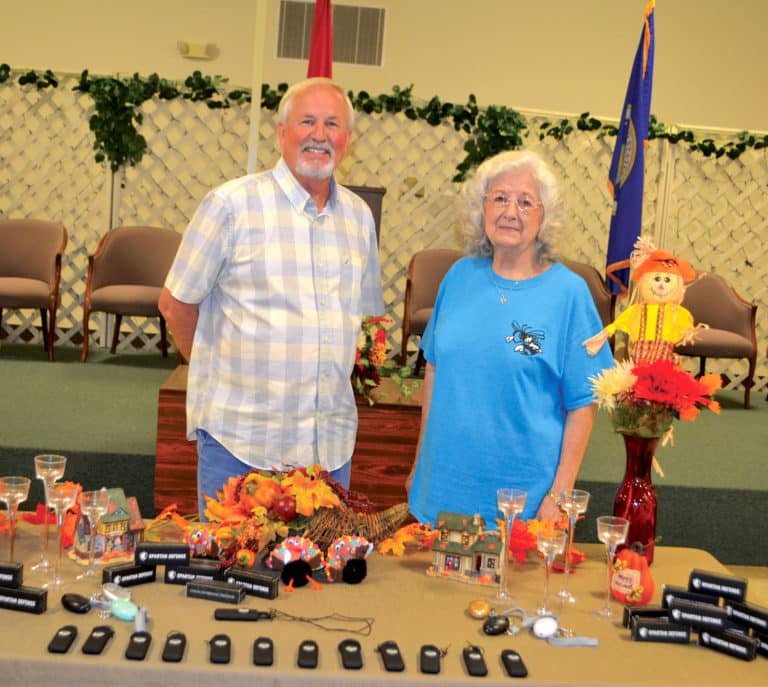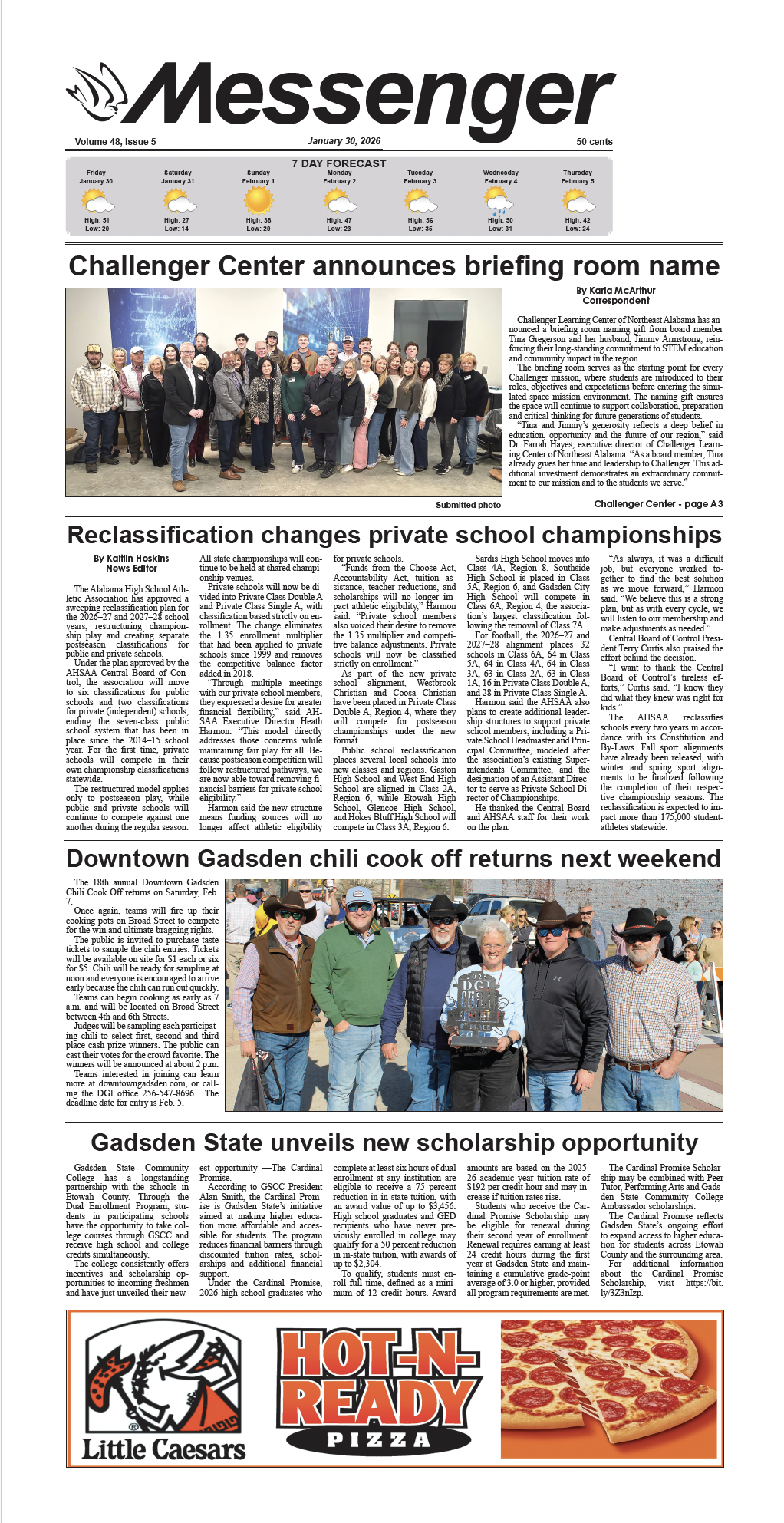Photo: Nutrition Manager Steve Yarbrough (left) and Director Pat Hill (right) stand with their sound alarm display in George Wallace Senior Center in Glencoe.
10-13-2022
By Emma Kirkemier, News Editor
From hosting bingo games to delivering hot meals, Glencoe’s George Wallace Senior Center aims to welcome and serve its local seniors, a mission that has most recently manifested in purchasing sound alarms for homebound seniors at fall risk.
Nutrition Manager Steve Yarbrough joined the Glencoe senior center staff two months ago, he said, and one of his first projects was to provide safety alarms to homebound seniors living alone.
“I got to researching it and found out about these Life Alert bracelets,” Yarbrough said. “I talked to a few of the seniors, and they said, ‘That sounds great, but they really can’t afford the fees.’ So I just searched the web, and I found these alarms that are really loud. It said they’ll last up to a year and a half, but the alarm will go off for hours.”
The alarm is activated when the user pulls out its pin, immediately producing what Yarbrough could only describe as a “godawful” sound. It rings continuously for several hours, maintaining 130 decibels.
Yarbrough explained that the battery in each alarm lasts a year or more, so a year from now, the center will replace the batteries. The senior center received donations from the community via the “What’s Happening in Glencoe, AL?” Facebook group that allowed them to purchase the alarms, including a particularly generous donation from a local State Farm branch in Gadsden.
“Somebody from Glencoe mentioned it to this guy named Mike at State Farm, and he said, ‘Hey look, good idea, great. Anything we can do to help?’” Yarbrough said. “He said, ‘We want to give y’all a donation,’ so he brought $750 down here and gave it to us. That’s pretty much all we needed. We got what we needed from it.”
The senior center began distributing the alarms on October 12.
“We’re getting a lot of phone calls from people that’s wanting them,” Yarbrough said. “But right now we’re focusing on our homebounds that are wheelchair (users) or on a walker — their gate’s not straight. They just can’t walk. Those are the ones we’re going to focus on and just see where it goes from there.”
While Yarbrough has not received extensive feedback yet, the program seems promising from multiple perspectives.
“This is our senior group that comes in every day, and we’ve talked to them about it,” he said. “All of them say it’s a great idea, especially for their friends that are homebound that used to come with them, but now they can’t anymore.”
Homebound seniors who live alone are particularly at risk. Yarbrough recounted the story of one man who fell on a Friday and wasn’t found until his meal was delivered the following Monday. Yarbrough said the driver saw his Friday meal still untouched and called for help.
A loud alarm could help in situations like this one, especially if neighbors are notified to listen for its sound, like the folks in the senior apartment building have been. Seniors who have fallen could alert neighbors to their situation via this device, or, failing that, activate it when they know their next meal will be delivered to alert senior center staff.
According to Yarbrough, the sound will continue at 130 decibels for “longer than they’re going to want to hear it,” and the alarm can be silenced by replacing the pin.
“But we’re going to go and talk to them and first of all see if they want it, see if they’ll accept it,” Yarbrough said. “I feel like anything that we can do to help people stay independent (will be valuable) because they don’t want to go to nursing homes. They want to stay home.”
According to Yarbrough, some homebound seniors are more unwilling than unable to leave their homes. Many members of that age group lost family and friends to COVID-19 in the last few years, so Yarbrough said senior survivors of the pandemic may remain concerned about being infected.
“A lot of them are not really as much impaired in any kind of way as they’re paranoid about COVID,” he said. “They won’t come out of their house. And that’s my goal, is to try to get them out of their house, get them down here.”
Before coming out of retirement and working at the senior center, Yarbrough worked with patients struggling with substance abuse and mental health disorders. He founded Rapha Treatment Center, a 60-bed mental health and substance abuse center in Attalla which remains active in addiction rehabilitation.
“I worked in substance abuse and mental health all my life, so I know this group of people,” Yarbrough said. “They appreciate anything you do for them.”
He pointed out that being stuck in a one- or two-bedroom apartment with little to no outside contact has had negative, even depressive effects on many local shut-ins.
“I think that’s probably going to be my biggest goal here is trying to build a rapport with people and get them out,” Yarbrough said.
Glencoe Senior Center offers a wide array of programs, including a nutrition program, regular games and activities, tax filing assistance and multiple exercise programs.
The center will offer vision, hearing and dental health screenings sponsored by the Lion’s Club, Alabama Institute for the Deaf and Blind and UAB School of Dentistry on October 26 from 9:30 a.m. to 11:30 a.m. at 407 Hollingsworth Park Dr. in Glencoe.





